by Jonathan BROWN and Elizabeth STRIY in Warsaw
Agence France-Presse
Kyiv, Ukraine (AFP) — Olga Slyshyk began to fear the worst in January this year when her husband, Mykhailo, a military engineer serving on the front line in eastern Ukraine, didn’t contact her on her birthday.
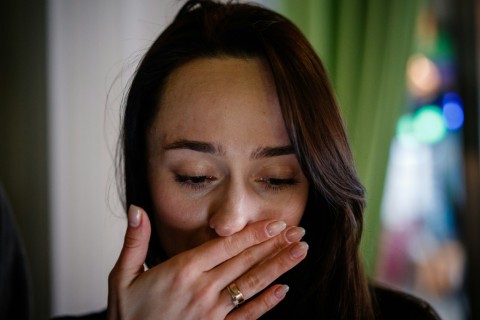
It wasn’t unusual for the 40-year-old trained lawyer to be offline for days at a time, but Slyshyk knew he would reach out — one way or another — on January 14 if he was alive and well.
“I was sure he would call or find some way to congratulate me. But I had had a very bad dream and I already knew something was wrong,” she told AFP in Kyiv wearing black and holding her two-year-old son Viktor.
“On January 15, I found out he had died.”
More than one year after Moscow invaded, Slyshyk is among a growing number of women widowed by Russian forces and left to count the cost of Ukraine’s determination to hold out and push Moscow’s invasion back.
Neither side has disclosed the exact figures of troops killed, though recently leaked US intelligence documents suggest as many as 17,500 Ukrainian servicemen have been lost.
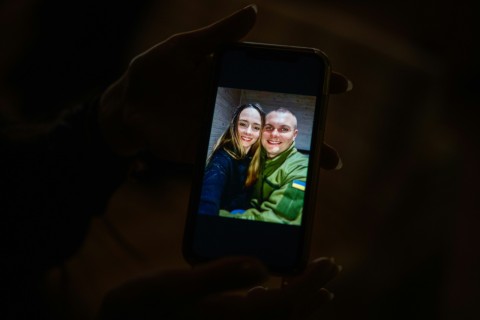
Slyshyk said a social media group for war widows she joined had more than 300 members after her husband was killed defending Soledar in the eastern Donetsk region, but it had doubled in size since.
– ‘You learn to live with it’ –
President Volodymyr Zelensky last August hosted widows and their children at an honours ceremony to reassure next of kin their loved ones’ sacrifice had not been in vain.
“They will remain forever at battle. But they live on in the memory of their relatives,” he said, greeting mourning women and their children one by one.
Thirty-year-old Slyshyk, who was born in Mariupol — a port city besieged and captured by Russian forces last spring — said she often evokes the memory of her killed husband.
“All the time. Both in my head and aloud. I’ll be unable to open a tin can, weeping from frustration, and I cry out: ‘Misha, I’m not even able to do this’ and then suddenly, it opens.”
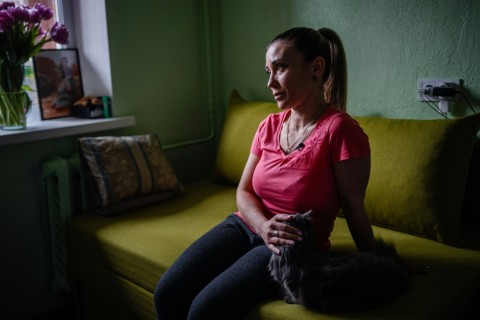
Daria Mazur, 41, said she learned of her husband’s death in 2014 from graphic pictures of his bloodied corpse published on Russian media after fierce fighting with Kremlin-backed separatists.
He was killed while withdrawing from Ilovaisk, an infamous and costly chapter of the conflict for Ukraine that saw hundreds killed that August as Kyiv troops pulled back in the face of advancing pro-Russian forces.
“Time does not heal. You just get used to it. You accept it. You learn to live with it. And that pain just becomes a part of you,” she told AFP in her kitchen in Kyiv, next to pictures showing her husband smiling with their child in his arms.
They met on a beach in2006, fell in love and married in 2010 in the southern region of Kherson, where Mazur fled from when Russia invaded last February. Her home town is currently occupied by Russian forces.
She said her final conversations with her husband, Pavlo, who was 30 when he was killed, betrayed a sense of foreboding. He knew the situation was precarious.
“He told me: ‘please promise me that no matter what happens to me, you will be happy,'” she recounted to AFP.
– ‘I need you by my side’ –
“These guys are giving their lives so we can live on,” she added, referring to Ukrainian servicemen fighting now.
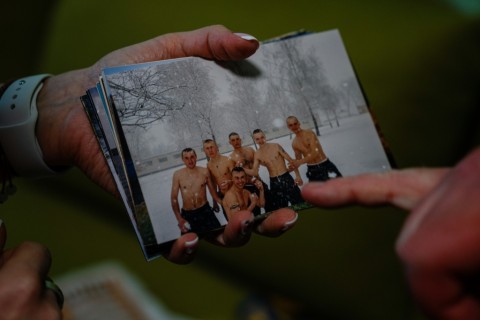
It was precisely this need to go on that pushed Oksana Borkun, who also lost her husband to the Russian invasion, to create “We Have to Live,” an organisation that supports widows — the same group that Slyshyk joined.
Borkun said that while the government offers financial and psychological support, she wanted to go a step further.
“The girls face a huge amount of pain. You can say it’s possible to go crazy from it. Life is going on around you, and you want to talk to those who understand.”
The organisation gathers money for widows, offers logistical and moral support, too, but chiefly it provides a platform — mainly online — for already nearly one thousand widows country-wide to share.
For Slyshyk, her husband’s family has proven a stronger pillar of support than her own.
Her mother, who is also a widow of two years, lives in Donetsk, a pro-Russian stronghold city captured by separatists in 2014 and does not support Ukraine in the war.
The fact they have both lost their husbands has not brought them together, she said.
Months after Mykhailo’s death, Slyshyk is torn when weighing whether his sacrifice was worth it.
“He said he was going there for me and Viktor,” she recounted, explaining her husband believed Ukraine had no choice but to fight back and win.
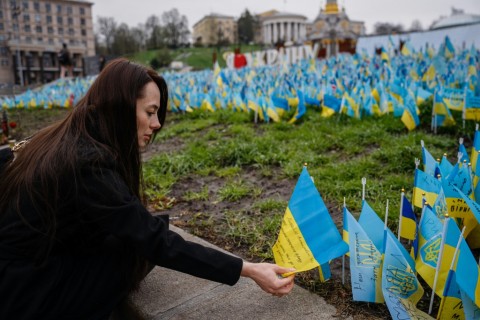
“But if you want me to be safe, to be ok, I need you by my side, not somewhere else,” she added, swallowing back tears.
“For now, I’m emotionally conflicted”.








